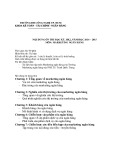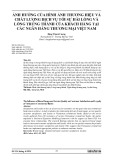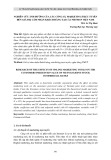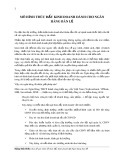
TRƯỜNG ĐẠI HỌC KINH TẾ - ĐẠI HỌC ĐÀ NẴNG
24
FRONTLINE BANK STAFF’S SOCIAL CAPITAL,
ADAPTIVE SELLING BEHAVIORS AND SALES PERFORMANCE
VỐN XÃ HỘI CỦA NHÂN VIÊN TUYẾN ĐẦU NGÂN HÀNG, HÀNH VI BÁN HÀNG
THÍCH ỨNG VÀ HIỆU QUẢ BÁN HÀNG
Ngày nhận bài: 08/04/2024
Ngày nhận bản sửa: 27/08/2024
Ngày chấp nhận đăng: 31/08/2024
Nguyen Van Ha
, Nguyen Duc Dat
ABSTRACT
Understanding how salespeople’s characteristics influence their effective selling as well as
consequences of adaptive selling are important in managing the salesforce, given the growing
complexity of selling settings. Drawing on job demands-resources framework and Stimulus-
Organism-Response model, the purpose of this paper is threefold. First, we examine the impact of
social capital on the adaptive selling behaviors of frontline bank employees in a relatively under-
researched context. Second, several mediating mechanisms underlying this relationship are also
explored in this research. Third, the effectiveness of adaptive selling behaviors is revisited by
testing its effect on sales performance. Data have been obtained from 280 frontline employees
working at Vietnamese commercial banks employing a questionnaire survey. Empirical analyses
reveal that employees’ social capital is positively related to adaptive selling behaviors, and that
person-job fit and work engagement are significant mediating factors explaining the linkage
between social capital and adaptive selling behaviors. Moreover, a positive association between
adaptive selling behaviors and sales performance is also documented in this study. Our research
findings provide important practical implications for bank managers.
Keywords: Adaptive selling; person-job fit; sales performance; social capital; work engagement.
TÓM TẮT
Trong bối cảnh các điều kiện bán hàng ngày càng trở nên phức tạp, việc hiểu rõ ảnh hưởng của
các đặc điểm của nhân viên bán hàng đến hành vi bán hàng thích ứng cũng như hệ quả của bán
hàng thích ứng là rất quan trọng. Dựa trên khung lý thuyết về yêu cầu-nguồn lực công việc và mô
hình Kích thích-Cơ thể-Phản ứng, bài báo này thiết lập ba mục tiêu chính. Đầu tiên, chúng tôi xem
xét tác động của vốn xã hội đến hành vi bán hàng thích ứng của nhân viên ngân hàng tuyến đầu
trong một bối cảnh nghiên cứu mà mối quan hệ này vẫn chưa sáng tỏ. Thứ hai, chúng tôi xem xét
một số cơ chế trung gian giải thích mối quan hệ này. Thứ ba, hiệu quả của hành vi bán hàng thích
ứng được kiểm chứng bằng cách đánh giá tác động đến hiệu suất bán hàng. Dữ liệu được thu
thập từ 280 nhân viên tuyến đầu làm việc tại các ngân hàng thương mại Việt Nam bằng cách sử
dụng khảo sát thông qua bảng hỏi. Các phân tích thực nghiệm cho thấy vốn xã hội của nhân viên
tuyến đầu có liên quan tích cực đến hành vi bán hàng thích ứng, ngoài ra sự phù hợp với vị trí làm
việc của người lao động và sự gắn kết trong công việc là những yếu tố trung gian quan trọng giải
thích mối liên hệ giữa vốn xã hội và hành vi bán hàng thích ứng. Hơn nữa, mối liên hệ tích cực
giữa hành vi bán hàng thích ứng và hiệu suất bán hàng cũng được ghi nhận trong nghiên cứu
này. Các kết quả nghiên cứu của chúng tôi cung cấp những hàm ý thực tế quan trọng cho các nhà
quản lý ngân hàng.
Từ khóa: Bán hàng thích ứng; sự phù hợp với vị trí làm việc; hiệu quả bán hàng; vốn xã hội, sự
gắn kết trong công việc.
1. Introduction
Social capital has received considerable
academic attention over the past decades. It
is commonly defined as “the goodwill
available to individuals or groups. Its source
lies in the structure and content of the actor’s
social relations). 1Its effects flow from the
information, influence, and solidarity it
Nguyen Van Ha, Nguyen Duc Dat, Foreign Trade
University
Email: ha.nguyen@ftu.edu.vn

TẠP CHÍ KHOA HỌC KINH TẾ - SỐ 11(03) 2023 - 2024
25
makes available to the actor” (Adler and
Kwon, 2002, p. 23). Given its role of an
intangible resource (Mathwick et al., 2008),
social capital may facilitate both individuals
and organizations in pursuing their specific
goals (Adler and Kwon, 2002).
Frontline employees (FLEs) refer to those
who in their work role have regular contact
with the company’s customers (Slåtten and
Mehmetoglu, 2011). In a market where
customers can easily switch to the
competitors like the banking industry,
frontline employees’ behaviors strongly
impact customers’ buying decisions.
Previous studies indicate that social capital
significantly influences individual career
outcomes (Zhang et al., 2010) and
organizational performance (Acquaah, 2007).
However, little is known about the effect of
social capital on frontline employees’
adaptive selling behaviors, which refer to
“the altering of sales behaviors during a
customer interaction or across customer
interactions based on perceived information
about the nature of the selling situation”
(Weitz et al., 1986, p. 175). As adaptive
selling behaviors are important antecedents
of customer orientation and job satisfaction
(Franke and Park, 2006), which potentially
have profound implications for the
company’s longevity, it is necessary to
expand our understanding on determinants of
adaptive selling behaviors. This motivates us
to focus on examining how salespeople’s
social capital influences their adaptive selling
behaviors.
Our study attempts to validate the impact
of social capital on adaptive selling behaviors
of frontline employees at commercial banks
in Vietnam. With commercial banks
continuously expanding their business, it is
essential to enhance their frontline
employees’ adaptive selling behaviors given
that these employees interact directly with
customers (Schepers and Borgh, 2020) and
are responsible for establishing, sustaining,
and enhancing customer relationships on
behalf of their organizations (Baumann et al.,
2017). Due to the increasing competition in
the Vietnamese banking sector as a
consequence of the country’s commitments
when joining the WTO in 2007, this study is
expected to provide useful insights into
adaptive selling, which can be enhanced
through salespeople’s social capital, and help
maintain Vietnamese banks’ competitive
position in their dynamic marketplace. In this
study, we decompose social capital into
internal and external components and
examine their impacts on frontline
employees’ adaptive selling behaviors based
on job demands-resources perspective
(Bakker et al., 2003). The association
between social capital and frontline
employees’ sales performance is also tested
in our study. Using primary data collected
from 280 frontline staff working at different
commercial banks in Vietnam, we provide
evidence that social capital enhances
adaptive selling behaviors via person-job fit
and work engagement. Our research findings
also suggest a positive influence of social
capital on frontline employees’ sales
performance.
This study makes several significant
contributions. First, we contribute to the
social capital literature by identifying
adaptive selling as a positive outcome of
frontline employees’ social capital. Second,
we complement the extant literature on
adaptive selling by suggesting social capital
as one of its important antecedents.
Additionally, we highlight the critical roles
of person-job fit and work engagement in
mediating the association between
salespeople’s social capital and adaptive
selling. Last but not least, our research
findings enrich our knowledge on the

TRƯỜNG ĐẠI HỌC KINH TẾ - ĐẠI HỌC ĐÀ NẴNG
26
relationship between social capital and
adaptive selling behaviors by providing new
empirical evidence from Vietnam. Although
several studies have examined frontline
employees’ role in the Vietnamese banking
sector (e.g., Dang and Pham, 2020; Le et al.,
2022), our study is the first to explore the
influences of frontline bank staff’s social
capital on adaptive selling behaviors.
The remainder of this study is as follows.
Section 2 reviews relevant literature and
develops our hypotheses. Research design is
presented in section 3, followed by research
results and discussion in section 4. Section 5
concludes the paper.
2. Literature review and hypothesis
development
2.1. Literature review
Job demands-resources (JD-R)
framework
According to the JD-R framework
(Bakker et al., 2003), work characteristics
can be classified into two main categories,
namely job demands and job resources. Job
demands are understood as job requirements
concerning sustained physical,
psychological, social and organizational
efforts, and hence are accompanied by
psychological and physiological costs. Job
resources include physical, psychological,
social and organizational attributes of the
job. Job resources play a critical role in
achieving job targets, reducing job demands
as well as related psychological and
physiological costs, and enhancing personal
growth and development. Also, job demands
may exert impact on job resources. For
instance, job demands such as high work
pressure and emotionally demanding
interactions with customers may impair the
mobilization of job resources (Bakker et al.,
2003). In general, there is a negative
association between job demands and job
resources. While job demands act as
potential initiators of emotional exhaustion,
job resources are considered as initiating a
motivational process (Huang et al., 2019).
Stimulus-Organism-Response (S-O-R)
model
The S-O-R model, initially proposed by
Mehrabian and Russell (1974), holds that
some environmental factors lead to certain
behavioral outcomes by provoking
individuals’ emotional and cognitive
conditions. Three components included in the
model are stimulus, organism and response.
Stimulus is the influence that excites
individuals. Organism refers to the internal
process that mediates the linkage between
stimulus and the individuals’ behavior.
Response refers to the consequences of the
second component. Recent studies have
extended this model to the domain of
employee behavior (e.g., Tang et al., 2019)
Social capital
Social capital theorists (Adler and Kwon,
2002) suggest that working environments
that foster trust, friendliness and goodwill
positively influence work performance.
Social capital, therefore, is commonly
viewed as a valuable strategic resource
(Luthans et al., 2004). The social capital
literature distinguishes between internal and
external social capital. The former focuses on
relationships with other members of an
organization, while the latter indicates
connections with external parties.
Person-job fit
Person-job fit refers to the match between
attributes of the person and those of the job
(Edwards, 1991). The extant literature reports
that person-job fit is important in improving
employee well-being and performance at work
(Kristof-Brown et al., 2005). There are two
primary aspects of person-job fit, namely

TẠP CHÍ KHOA HỌC KINH TẾ - SỐ 11(03) 2023 - 2024
27
demands-abilities fit and needs-supplies fit.
The former indicates the extent to which an
individual’s abilities are congruent with what
the job requires. The latter is defined as the
extent to which an individual’s needs are
satisfied by the supplies that stem from the
job. While demands-abilities fit attends more
to the job, needs-supplies fit focuses more on
the individual.
Work engagement
According to Schaufeli et al. (2002), work
engagement is a state of mind featured by
vigor, dedication and absorption.
Particularly, vigor refers to high levels of
vital energy and mental resilience, dedication
is defined as strong involvement in the work
along with a sense of significance,
enthusiasm, and challenge, and dedication is
understood as being fully concentrated and
deeply engrossed in the work. Enhancing
employees’ work engagement is documented
to yield significant benefits to firms such as
fewer quality problems, better customer
service, and superior sales growth (Viljevac
et al., 2012).
Adaptive selling behaviors
Previous studies suggest that salespeople
who actively adjust sales presentations across
sales encounters exhibit a high degree of
adaptive selling, while those who employ
standardized sales presentations in different
sales situations demonstrate a low degree of
adaptive selling (Spiro and Weitz, 1990).
Salespeople are expected to change how they
sell based on customer feedback and
information about the nature of the situation
(Singh et al., 2017), given that there is no
universally applicable sales strategy (Yoo
and Todd, 2019). Engaging in adaptive
selling behaviors requires salespeople to
have basic information acquisition skills as
well as knowledge about sales situations
(Zhou and Charoensukmongkol, 2022).
JD-R framework and S-O-R model have
been commonly used in researching
individuals’ behaviors. For instance, Li et al.
(2021) employ the former to investigate the
impact of hotel employees’ intangible
resources on their work-related stress and
turnover intention in China and report the
significant relationships. Lu et al. (2023) use
the same framework to explore how
sustainable human resource management
contributes to better employee wellness and
enhanced employee performance in China.
While S-O-R model is more often employed
to explain consumer behaviors (e.g., Kim et
al., 2020; Pereira et al., 2023), several studies
have drawn on the S-O-R model to study
employees’ behaviors (e.g., Jung et al., 2021;
Lee and Yoo, 2022). Following these studies,
we apply both JD-R and S-O-R perspectives
in our investigation of the social capital -
adaptive selling relationship considering the
roles of person-job fit and work engagement.
Although this association has been analyzed
in Korean context by Lee and Yoo (2022),
we re-examine it in an unexplored research
setting and expand their study by
determining the impact of adaptive selling
behaviors on sales performance.
2.2. Hypothesis development
2.2.1. The relationship between social
capital and person-job fit
Frontline employees’ social capital is
expected to increase person-job fit by
enhancing FLEs’ abilities to meet their job’s
demands and fostering the congruence
between FLEs’ needs and the rewards
originating from their job. As Cabello-
Medina et al. (2011) indicate, strong social
capital can improve employees’ knowledge,
skills and other abilities because social
capital, manifesting in FLEs’ daily
interactions with their colleagues and
customers, facilitates information sharing

TRƯỜNG ĐẠI HỌC KINH TẾ - ĐẠI HỌC ĐÀ NẴNG
28
and knowledge transfer. Employees equipped
with such valuable knowledge and skills
through a high level of social capital are
better able to successfully address their job’s
requirements (Sanchez-Famoso et al., 2020),
thereby improving the demands-abilities fit.
Moreover, FLEs with a high level of social
capital are likely to have more access to
resources stemming from their job such as
useful information received from colleagues
and customers, better cooperation and
coordination with people inside and outside
their firms (Tang, 2016). Such resources
supplied by their job enable better fulfilment
of FLEs’ psychological needs, which leads to
the enhanced needs-supplies fit (i.e., person-
job fit). Accordingly, the first two hypotheses
are stated as follows:
H1: There is a positive association
between internal social capital (ISC) and
person-job fit (PJF).
H2: There is a positive association
between external social capital (ESC) and
person-job fit (PJF)
Dess and Shaw (2001) assert that social
capital is a critical resource for both
individuals and their firms. Social capital can
increase employees’ favorable attitude and
behavior because close connections with
colleagues help them feel more embedded in
their firms (Mossholder et al., 2005) and
more committed to their firms (Ellinger et
al., 2013). Stro¨mgren et al. (2016) report
that social capital significantly improves
work engagement of healthcare
professionals. We therefore propose that:
H3: There is a positive association
between internal social capital (ISC) and
work engagement (WE).
H4: There is a positive association
between external social capital (ESC) and
work engagement (WE).
Person-job fit is a crucial element in
determining employees’ attitudes towards
work and their performance (Bui and Zeng,
2017; Wing, 2018). Scholars have
emphasized the significance of high person-
job fit, which is associated with positive
outcomes in the workplace (Wing,
2018). FLEs whose perception of person-job
fit is high are likely to be more engaged in
their job because their values and identities
can be embedded in their work (Guo and
Hou, 2022). Kim and Gatling (2019) show a
positive relationship between person-job fit
and customer-contact hotel employees in the
U.S. Likewise, Chen et al. (2014) find
similar evidence in the Taiwanese hotel
industry regarding the influence of person-
job fit on work engagement. Thus, the
following hypothesis is proposed:
H5: There is a positive association
between Person-job fit (PJF) and work
engagement (WE).
2.2.2. The relationships between work
engagement and adaptive selling behaviors
Work engagement refers to a high level of
simultaneous investment of personal
resources in the performance of work
(Christian et al., 2011). Ahmad et al. (2022)
suggest that engaged employees are likely to
devote more adequately of their time and
talent to new solutions to tackle challenges
from work. Menguc et al. (2013) hold that
engaged employees find their jobs more
meaningful and inspirational, and thus they
take a proactive approach in handling their
work including providing excellent services
to their customers. Therefore, work
engagement should positively influence the
practice of ASB. Accordingly, we
hypothesize that:
H6: There is a positive association
between work engagement (WE) and
adaptive selling behaviors (ASB).


























